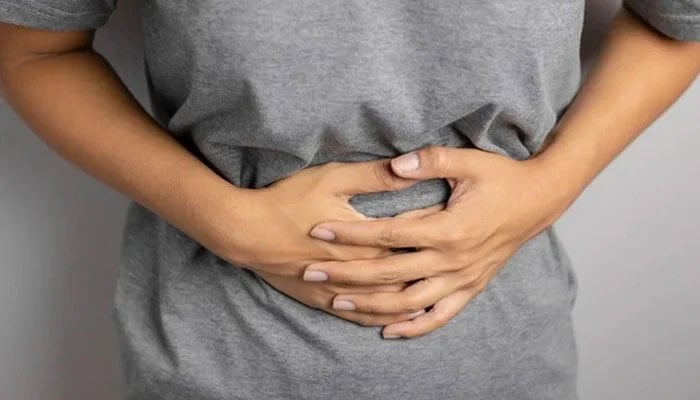‘Acute gastroenteritis, delayed restoration of diarrhoeal losses may be life-threatening’
Islamabad: Acute gastroenteritis is one of the major causes of acute kidney injury (AKI) that may lead to life-threatening conditions among fasting patients while medically it is proven that inadequate or delayed restoration of diarrhoeal losses results in a very high incidence of AKI.
Complications of gastroenteritis and dehydration may be life-threatening and the patients while fasting should not take the conditions as non-serious. The patients suffering from severe diarrhoea, while fasting, need extra care as they may face electrolytes imbalance in the body. The fasting individuals may suffer from loss of fluids. These conditions can cause a number of complications particularly among children, elderly people and pregnant women. Studies reveal that Gastroenteritis is inflammation of the stomach, small intestine, or large intestine, leading to a combination of abdominal pain, cramping, nausea, vomiting, and diarrhoea. Acute gastroenteritis usually lasts fewer than 14 days. Acute gastroenteritis is caused by many infectious agents, which can be viral, bacterial or parasitic.
It is important that severe gastroenteritis and shock is generally started with vomiting and loose motions leading to a severe loss of fluids in the body and many patients may feel drowsiness and become unable to pass urine. The condition may cause death in the absence of early treatment. Experts say that the patients while fasting must be aware of various aspects of the disease, acute gastroenteritis and its complications including acute kidney injury. In severe diarrhoea, fluid replacement is the mainstay of symptomatic treatment along with diet restrictions and in this condition, it may not be possible for many to observe fasting in the holy month of Ramazan. In most of the cases of diarrhoea, oral rehydration is ideal, but intravenous hydration may be needed in case of severe dehydration.
Health experts say that the public must be aware of the fact that gastro is dangerous particularly at extremes of ages and in pregnant women particularly when they are under fast. Pregnant women having persistent vomiting or loose motions may not be able to fast especially in the first three months of pregnancy (first trimester) and the last three months of pregnancy (third trimester).
It is generally observed that the number of cases of dehydration and gastroenteritis register a significant increase in Ramazan and according to health experts, it is so mainly because majority of the people do not give due attention to diet. By following good dietary habits, use of clean water for drinking and consumption of safe food prepared in hygienic conditions, people can avoid gastroenteritis and a number of other infections in Ramazan.
Gastroenteritis in general is water and food borne infections and its main symptoms include vomiting, fever, severe diarrhoea with dehydration and lowering of blood pressure. Individuals suffering from complaints of diarrhoea and vomiting may not be able to avoid loss of fluids and electrolytes under the fast and according to health experts, it would be better for them to break open the fast immediately after developing symptoms of gastro to avoid complications.
The patients suffering from diarrhoea should take plenty of fluids and ORS for at least three days. It is recommended for everyone to avoid food prepared in unhygienic conditions and use boiled water for drinking to avoid gastroenteritis.
-
 Prince William Should Focus On 'family Business' After Andrew Blunder
Prince William Should Focus On 'family Business' After Andrew Blunder -
 Katherine Schwarzenegger Pratt 'brought To Tears' By Sister-in-law's Gesture
Katherine Schwarzenegger Pratt 'brought To Tears' By Sister-in-law's Gesture -
 Prince William Makes Bold Claim About Britain's Creative Industry At BAFTA
Prince William Makes Bold Claim About Britain's Creative Industry At BAFTA -
 Andrew Mountbatten Windsor Insulting 'catchphrase' That Degarded Staff
Andrew Mountbatten Windsor Insulting 'catchphrase' That Degarded Staff -
 Kate Middleton, Princess Beatrice 'undercurrent Tension' Comes To Surface
Kate Middleton, Princess Beatrice 'undercurrent Tension' Comes To Surface -
 'Grey's Anatomy' Alum Katherine Heigl Reveals Why She Stayed Silent After Eric Dane Loss
'Grey's Anatomy' Alum Katherine Heigl Reveals Why She Stayed Silent After Eric Dane Loss -
 Host Alan Cumming Thanks BAFTAs Audience For Understanding After Tourette’s Interruption From Activist
Host Alan Cumming Thanks BAFTAs Audience For Understanding After Tourette’s Interruption From Activist -
 Jennifer Garner Reveals Why Reunion With Judy Greer Makes Fans 'lose Their Minds'
Jennifer Garner Reveals Why Reunion With Judy Greer Makes Fans 'lose Their Minds' -
 Chris Hemsworth Makes Shocking Confession About His Kids' Reaction To His Fame
Chris Hemsworth Makes Shocking Confession About His Kids' Reaction To His Fame -
 Wiz Khalifa Reveals Unconventional Birthday Punch Tradition With Teenage Son In New Video
Wiz Khalifa Reveals Unconventional Birthday Punch Tradition With Teenage Son In New Video -
 BAFTAs 2026: Kerry Washington Makes Debut In Custom Prada Gown
BAFTAs 2026: Kerry Washington Makes Debut In Custom Prada Gown -
 Jennifer Lopez Gets Emotional As Twins Max And Emme Turn 18
Jennifer Lopez Gets Emotional As Twins Max And Emme Turn 18 -
 Andrew Mountbatten Windsor Blunders Are Result Of 'conspiracy Of Silence'
Andrew Mountbatten Windsor Blunders Are Result Of 'conspiracy Of Silence' -
 Keith Urban Fires Entire Management Team After Divorcing Nicole Kidman
Keith Urban Fires Entire Management Team After Divorcing Nicole Kidman -
 Kylie Jenner Marks Death Anniversary Of Hairstylist Jesus Guerrero With '222' Tribute
Kylie Jenner Marks Death Anniversary Of Hairstylist Jesus Guerrero With '222' Tribute -
 Daniel Radcliffe On How It's Like Seeing New Harry Potter Cast Years Later
Daniel Radcliffe On How It's Like Seeing New Harry Potter Cast Years Later




